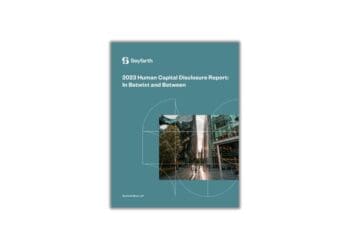ESG-driven initiatives in the corporate sector continue to expand. In response, controversial policy proposals are gaining traction in statehouses around the country, along with the newly formed Anti-ESG Alliance, a collection of 19 states pledged to protect their constituents from what the group calls a radical movement. And yet, for several states in the alliance, the drive to maintain or advance their pro-business reputation may stand in the way of large-scale anti-ESG policy and legislation. Andrew Herman and Michelle McClafferty of Lawrence & Bundy explore the tensions between self-proclaimed anti-ESG states and ESG-minded corporations, with a spotlight on Georgia and what we can learn from its string of high-profile showdowns with major corporations on topics like healthcare and election administration.
Though it’s not exactly new, the corporate ESG movement has gained significant momentum in recent years, as corporations and their stakeholders prioritize sustainable and responsible investment decisions.
ESG concerns are not limited to the corporate sector, however. Government and regulatory leaders are also speaking out, some for and some against ESG considerations, to articulate their vision for the country’s economic future. California Gov. Gavin Newson recently touted his state’s ESG-aligned policies and criticized Republican attacks on ESG investing as “defy[ing] the free market” at the expense of taxpayers. On the opposite end of the spectrum, New Hampshire Gov. Chris Sununu recently issued an executive order prohibiting the investment of state-controlled funds with firms investing based on ESG criteria. Unsurprisingly, both sitting governors are rumored to be weighing their prospects for the presidency in 2024 or beyond.
The conflict over the ESG movement highlights the intersection of politics and business, as corporations weigh the potential economic and social consequences of taking a stance on hot-button issues in the face of skepticism toward, or direct opposition to, this burgeoning integration of ESG considerations into business decisions. Those in favor of ESG see an opportunity to enhance value for shareholders and communities, while others believe ESG interferes with efficiency and imposes an inappropriate and unjustified level of subjectivity upon economic decision-making. Recently, this group of ESG critics organized and formalized their position, promising to convert their anti-ESG ideology into action. But just as not all companies pursue identical ESG goals, not all states opposing ESG measures will adopt identical approaches. Indeed, fissures in the state-level anti-ESG movement are already forming.
We Still Haven’t Seen the SEC’s Final Disclosure Rules, But We Already Know the Impact Won’t Be Equal
SEC regulations on what companies must report regarding their environmental impact are expected this year. While large firms and those in high-carbon industries have already started disclosing some of this information, as FTI Consulting’s Ben Herskowitz and Todd Rahn discuss, both size and sector play a role
Read moreThe anti-ESG movement
Earlier this year, a coalition of 19 governors, all Republicans, pledged to protect their constituents from the “radical environmental, social, and corporate governance (ESG) movement.” The Anti-ESG Alliance, as the group has been named, has prioritized opposing corporate actors, and financial institutions specifically, it perceives as “inject[ing] political ideology … into the everyday economy.” The group casts the proliferation of ESG as “a direct threat to the American economy, individual economic freedom, and our way of life,” caused by the “corporate elite” and “the woke mob.”
Though formed without legislative action, the coalition is advocating for an agenda that will fall to statehouses across the country to enact. In its inaugural policy statement, the group focuses on blocking the use of ESG in investment decisions, eliminating consideration of ESG factors by government actors issuing bonds, banning the use of “social credit scores” by the financial sector and prohibiting so-called “discrimination” by financial institutions based on a customer’s beliefs on issues like firearm ownership or border security. If the alliance’s planned efforts appear narrowly defined, its overarching commitment to “protect[ing] citizens from ESG influences in the financial sector” could still presage forays into broader policy issues.
Anti-ESG and pro-business: How long can they co-exist?
Faced with the increased application of ESG principles to meet shareholder expectations, limit risk and achieve long-term performance goals, the political leaders committed to the anti-ESG movement risk jeopardizing their once-touted reputation as business-friendly. And with the 2024 election cycle already underway, elected legislators may be disinclined to adopt anti-ESG policies that target the corporate sector for fear of undermining their pro-business positions just as voters head to the polls.
With the growing corporate emphasis on ESG, it is difficult to imagine how an anti-ESG stance would not impact public perception of a state’s business climate. After all, the Anti-ESG Alliance threatens to impose a challenging regulatory landscape that could discourage corporations otherwise keen to enter or expand their presence in states where governors have signed on. More nuanced factors — like the ability to maintain workforce satisfaction or attract appropriately skilled and trained employees in the face of policies that conflict with widely held ESG values — affect these decisions as well. As such, anti-ESG policies may tarnish the brand of states once regarded as favorable environments for maintaining and expanding a business.
In 2022, CNBC recognized four states in the alliance as among the top 10 for business — Tennessee (6), Nebraska (7), Utah (8) and Georgia (10). And Forbes recently ranked three alliance states in the top 10 places to start a business — North Dakota (3), South Dakota (5) and Montana (7). As alliance-aligned governors prepare for re-election, it is a safe bet they will tout these pro-business accolades to court corporate and individual donors and supporters alike. It remains to be seen if they can maintain those accolades in the face of their anti-ESG rhetoric.
Legislating in opposition to ESG-focused policy
As the first signatory and presumptive leader of the Anti-ESG Alliance’s inaugural policy statement, Gov. Ron DeSantis, long rumored as a 2024 candidate for the Republican presidential nomination, and the state of Florida are expected to lead the charge to develop and enact legislation prohibiting consideration of ESG factors in corporate decision-making. But many other state legislatures are also adopting anti-ESG policy positions that draw ire from the corporate sector without directly banning corporate consideration of ESG factors. In that vein, Georgia, committed to the alliance by Gov. Brian Kemp, offers a model for how legislative affronts to ESG priorities may drive conflict not only between the corporate sector and state lawmakers but potentially also among members of the Anti-ESG Alliance itself.
Healthcare access in Georgia
In 2019, Georgia passed a law known as the “heartbeat bill,” which restricts abortions once a fetal heartbeat is detectable — typically around six weeks of pregnancy. Though both federal and state courts temporarily blocked the law, it has taken effect following the U.S. Supreme Court’s decision in Dobbs v. Jackson Women’s Health Organization, which overturned 50 years of precedent protecting abortion rights.
Georgia’s heartbeat bill imposes criminal penalties on providers who violate the law through their treatment of patients. Though the criminal penalties of the heartbeat bill are confined to the healthcare industry, the legislation nonetheless drew intense public reaction from a broad range of major corporations. Corporate leaders threatened to withdraw their business from the state, predicting the legislation would negatively affect the talent pool in Georgia and, therefore, the business environment of the state. Among the corporations to publicly oppose the heartbeat bill were Netflix, Disney, WarnerMedia, AMC Networks, NBC Universal, Coca-Cola and Amazon.
Despite the strong negative reaction to its controversial healthcare law in 2021, in its 2023 legislative session, the Georgia legislature once again waded into the relationship between provider and patient, passing legislation that prohibits certain treatments for trans youth. Georgia is not the only state to debate or pass similar legislation in the 2023 session — the American Civil Liberties Union is tracking 119 healthcare bills across the country that would affect the rights and abilities of members of the LGBTQ community to receive medical treatment. But Georgia remains unique in its passage of additional legislation imposing penalties on medical providers on the heels of intense national scrutiny of a new abortion law. At least in this area, the Georgia legislature is comfortable in the vanguard of legislation imposing healthcare restrictions.
Election reform in Georgia
Similarly, Georgia has doubled down on socially unpopular legislation through several recent election administration policies. After enacting omnibus election reform in 2021, the Georgia legislature drew significant criticism that its new law would disproportionately affect voters of color and reduce access to voting. In response to the law, Major League Baseball relocated the 2021 All-Star Game and draft from Atlanta, a decision widely seen as a protest against the law. Numerous other corporate leaders spoke out about the new law and the importance of voting rights, including leaders from Delta Air Lines, Coca-Cola, Microsoft, JPMorgan Chase, ViacomCBS, Apple and Google.
In this year’s legislative session, the Georgia General Assembly took another shot at omnibus election reform, ultimately passing legislation that aims at corporate and nonprofit investment in Georgia elections through the grant of private funds to support county election administration. Though the law does not impose penalties on private funders, it criminalizes the counties’ acceptance of private funds for election administration. With the new election-funding legislation following so closely on the heels of corporate objections to Georgia’s election reform law, it is easy to perceive the new legislation as a message for corporate actors to stay away from all aspects of elections in Georgia.
Georgia’s anti-ESG model
While Georgia may be undeterred by recent corporate disapproval of its approach to social issues like healthcare and election administration, the state has stopped short of enacting express policies to control or penalize corporate consideration of ESG factors. While eschewing direct confrontation, Georgia policymakers do appear hostile — or, at best, heedless — to corporate decision-making informed by ESG considerations. Whether out of fear of electoral or another public backlash, Georgia’s less confrontational model offers a different approach that appears less inclined to legislate penalties for corporations. But if Georgia’s recent showdowns with the corporate sector are any indication, the state should not expect its more moderate approach to anti-ESG legislation to insulate the state from further backlash.
Fractures In the anti-ESG alliance
Though Georgia has aroused the ire of ESG-minded corporations and their stakeholders over issues relating to healthcare and elections, the state’s policymaking on environmental issues has taken a different tack. In recent years, Georgia has seen an increase in electric vehicle (EV) development, with 35 EV-related projects contributing $23 billion in investment in the state since 2018. The state even dubbed itself “a hub for the electric transportation industry.”
With its focus on consumer adoption of EVs and the mounting economic benefits of its EV investment, Georgia may be setting itself up for a showdown with Anti-ESG Alliance states committed to and dependent upon traditional energy sources as economic drivers. For example, alliance states Texas and North Dakota were responsible for more than 52% of crude oil production in the United States in 2021.
If Georgia’s recent courting of the EV industry is any indication, the state’s position on the environmental component of ESG may be viewed as antagonistic to the goals of the anti-ESG coalition. Georgia’s apparent divergence from the alliance’s platform on environmental issues raises a question: Will there be space in the alliance for states that support only a part of the initiative? As the Anti-ESG Alliance updates its policy goals and demonstrates the extent of its cross-state coordination, its members will have to reconcile their constituent states’ inconsistent or competing policy priorities. And as state governments and their political leaders continue to take varied approaches to the mounting influence of ESG, the anti-ESG movement may fracture or fizzle. This uncertainty demands close attention, and potentially political finesse, from business leaders planning to maintain or develop a multi-state or national presence.














